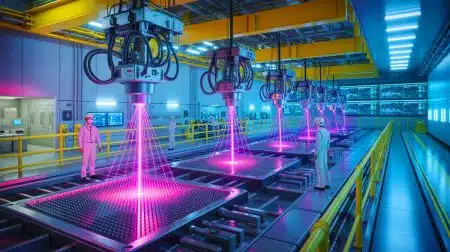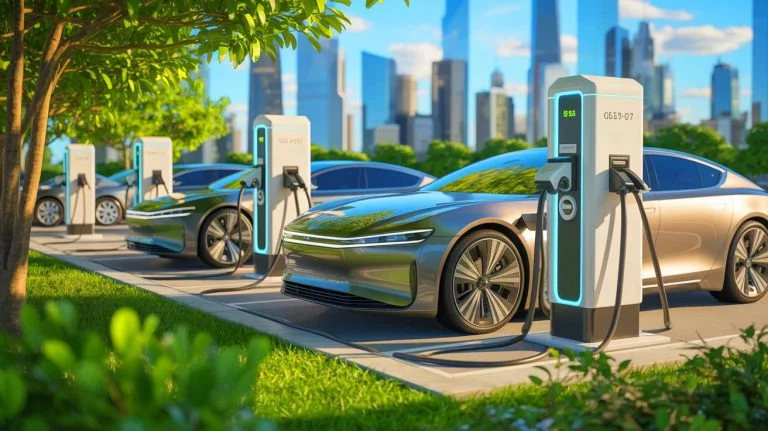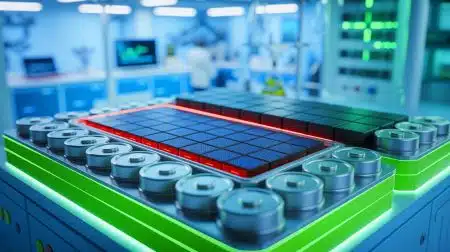| IN A NUTSHELL |
|
The transition to electric vehicles (EVs) has become a focal point in the global effort to reduce carbon emissions and combat climate change. However, one of the significant hurdles for widespread EV adoption is range anxiety, primarily driven by the time-consuming charging processes of traditional lithium-ion batteries. Recent breakthroughs in lithium-sulfur battery technology offer a promising solution, potentially revolutionizing the EV industry. These advancements could lead to faster charging times and longer vehicle ranges, paving the way for a more sustainable future.
Revolutionizing Battery Technology with Lithium-Sulfur
Lithium-sulfur batteries (LSBs) represent a significant leap forward in energy storage technology. Unlike conventional lithium-ion batteries, LSBs utilize a sulfur cathode and a metallic lithium anode, promising a theoretical capacity up to ten times greater. This innovation comes with the potential to extend the range of electric vehicles significantly, thereby addressing the prevalent issue of range anxiety among consumers.
One of the standout features of LSBs is their ability to charge much faster than existing technologies. According to an international study led by researchers from Germany, India, and Taiwan, these batteries could potentially achieve full charges in as little as 12 minutes. This capability would not only enhance the convenience of owning an electric vehicle but also make EVs more appealing to a broader range of consumers.
Despite the promise of LSBs, their development faces several technical challenges. Sulfur’s poor conductivity requires innovative solutions to enhance performance, including mixing it with carbon-based materials to facilitate electron transport. Additionally, overcoming the shuttle effect, where lithium polysulfides migrate between electrodes, is crucial for maintaining battery stability over time.
Addressing Technical Challenges in Battery Design
The path to commercializing lithium-sulfur batteries is fraught with technical obstacles that researchers are keen to overcome. A significant challenge lies in preventing dendrite formation on the lithium metal anode, which can lead to short circuits and pose safety risks. To address this issue, researchers are experimenting with protective coatings and engineered lithium structures designed to inhibit dendrite growth.
Advancements in cathode design are also underway to enhance the performance of LSBs. By incorporating advanced carbon-based materials such as graphene, researchers aim to improve the transport of electrons and ions, which is critical for efficient battery operation. The use of catalytic materials, including metal oxides, is being explored to accelerate sulfur conversion reactions and mitigate the effects of the shuttle phenomenon.
Furthermore, innovations in battery components, such as improved separators and highly concentrated electrolytes, are essential for rapid ion exchange and polysulfide containment. These developments are integral to increasing the energy density and lifespan of lithium-sulfur batteries, bringing them closer to practical application in electric vehicles.
Harnessing Artificial Intelligence in Battery Development
Artificial intelligence (AI) has emerged as a powerful tool in the optimization of battery materials, significantly accelerating the development of lithium-sulfur technology. By leveraging AI, researchers can predict the most effective combinations of materials that balance energy density, stability, and charging speed. This approach has already yielded prototypes demonstrating promising energy densities at practical charging rates.
Dr. Mozaffar Abdollahifar, a lead researcher in the field, highlights the importance of AI in advancing battery technology. “Our analysis indicates that charging times under 30 minutes, and in some cases under 15 minutes, are realistic,” he notes. This optimism is backed by a collaborative research effort involving institutions from Germany, India, and Taiwan, supported by several international funding bodies.
The integration of AI in battery development not only expedites the research process but also enhances the precision of material selection, leading to more reliable and efficient batteries. As AI continues to evolve, its role in energy storage solutions is likely to expand, driving further innovations in the field.
Implications for the Future of Electric Vehicles
The potential impact of lithium-sulfur batteries on the electric vehicle market is profound. With the capability to charge rapidly and provide extended driving ranges, these batteries could significantly boost the adoption of EVs. This shift would not only contribute to reducing greenhouse gas emissions but also lessen the world’s reliance on fossil fuels.
As researchers continue to refine lithium-sulfur battery technology, the vision of a fully electrified transportation system becomes increasingly tangible. The advancements in battery technology could lead to a future where electric vehicles are the norm, supported by infrastructure that accommodates quick and efficient charging.
The future of electric mobility is bright, with lithium-sulfur batteries at the forefront of this transformation. Will these technological advancements be the catalyst that finally propels us into a sustainable, electrified future?
Did you like it? 4.5/5 (21)








So, does this mean we can finally stop worrying about range anxiety for good? 🤔
12 minutes to charge? What are we going to do with all that extra time? 😂
Sounds promising, but I’ll believe it when I see it. How close are we to mass production?
Thank you for this insightful article! It’s exciting to see innovation in the EV space.
What about the cost of these lithium-sulfur batteries? Will they be affordable for the average consumer?
I’m curious how this will affect the resale value of current EVs with older battery tech.
Great news for green enthusiasts! But what about the environmental impact of mining sulfur?
This could be a game-changer for road trips! 🚗💨
Is it just me, or does this sound too good to be true? What are the potential downsides?
How does AI actually help in improving battery technology? Sounds like sci-fi!
Better start saving for my future EV! Thanks for the update! 😄
Can these batteries handle extreme weather conditions? That’s always been a concern for me.
I wonder how this will impact charging station infrastructure. Will we need fewer stations if charging is faster?
Wait… did someone say 12-minute charge? I’m all in! 🚀
How long until we can see these batteries in actual cars on the road?
Will the transition to lithium-sulfur batteries make existing EVs obsolete?
Is there any data on how these batteries perform over time? Longevity is key!
Exciting stuff! But how will this divide America as mentioned in the title?
12-minute charge sounds awesome, but what’s the catch? There’s always a catch. 🤨
I hope this technology is as promising as it sounds. The planet needs a break!
What role do governments play in promoting or hindering this kind of technological advancement?
Are any major car manufacturers already on board with this new battery technology?
How does the shuttle effect impact the battery’s performance? Sounds complicated!
Thanks for the article. It’s good to know there’s hope for faster charging times! ⚡
What’s the lifespan of these lithium-sulfur batteries compared to lithium-ion ones?
Can’t wait for the day when I don’t have to plan my trips around charging stations!
What about the safety concerns related to dendrite formation? Isn’t that a big issue?
How soon can we expect this technology to hit the market? I’m ready for an upgrade!
Why do they keep saying this will “divide America”? Seems a bit dramatic to me.
Thanks for the update! This could be a huge leap forward for sustainable transportation.
How does sulfur’s poor conductivity impact the overall performance of these batteries?
Does this mean the end of petrol cars? One can only hope! 🌍
How will this advancement impact jobs in the traditional auto industry?